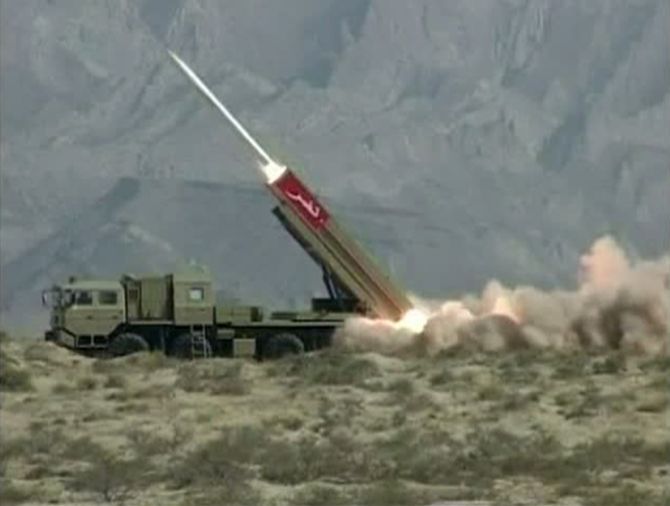
With Pakistan moving towards tactical nuclear weapons, there is an increasingly higher risk of nuclear theft, a US think-tank report has warned ahead of the Nuclear Security Summit in Washington later this month. However, Indian atomic facilities do not face terrorist threats as serious as those in Pakistan but the report expressed concern over "insider threats" against India's nuclear assets.
"Overall, the risk of nuclear theft in Pakistan appears to be high," said the report 'Preventing Nuclear Terrorism: Continuous Improvement or Dangerous Decline?' released by the prestigious Harvard Kennedy School.
"The trend seems to be toward increasing risk, as Pakistan's nuclear arsenal expands and shifts toward tactical nuclear weapons, while adversary capabilities remain extremely high," it said.
Over the longer term, the possibilities of state collapse or extremist takeover cannot be entirely ruled out, though the near-term probability of such events appears to be low.
The report from the Harvard Kennedy School comes a week after a top American diplomat had raised a similar concern. "We've been very concerned about Pakistan's deployment of battlefield nuclear weapons," US Under Secretary of State for Arms Control and International Security, Rise E Gottemoeller told members of the Senate Foreign Relations Committee during a Congressional hearing on Thursday.
"Battlefield nuclear weapons, by their very nature, pose security threat because you're taking battlefield nuclear weapons out to the field where, as, you know, as a necessity, they cannot be made as secure," Gottemoeller had said.
ON the other hand, India faces significant insider corruption though it is thought to be less severe than in Pakistan or Russia, it said.
In 2014, Vijay Singh, a CISF head constable at the Kalpakkam Atomic Power Station, shot and killed three people with his service rifle.
Although the CISF had a personnel reliability programme in place, it was not able to detect Singh's deteriorating mental health, despite multiple red flags including him saying that he was about to "explode like a firecracker", the report said.
In Pakistan, a modest but rapidly growing nuclear stockpile, with substantial security measures, must be protected against some of the world's most capable terrorist groups, in an environment of widespread corruption and extremist sympathies, said the Harvard Kennedy School.
By some estimates, the Strategic Plans Division, which manages Pakistan's nuclear weapons, has 25,000 troops available to guard Pakistani nuclear stocks and facilities.
Pakistani officials report that sites are equipped with extensive barriers and detection systems, that the components of nuclear weapons are stored separately (though that may be changing as Pakistan moves toward tactical nuclear weapons intended to be rapidly deployed to the field), and that the weapons are equipped with locks to prevent unauthorised use.
It said there are negative trends, which may be related to the absence of recent US expressions of confidence. "Pakistan has the world’s fastest-growing nuclear arsenal, and is shifting toward tactical nuclear weapons intended to be dispersed to front-line forces early in a crisis, increasing the risks of nuclear theft in such a crisis," it said.
"This increase in numbers of weapons is probably leading to an increase in numbers of locations as well," it said, adding that terrorist groups continue to demonstrate that they are willing and able to launch complex, well-coordinated attacks on heavily-defended military targets within Pakistan.
"Given the limited information available about India's nuclear security measures, it is difficult to judge whether India's nuclear security is capable of protecting against the threats it faces," the report said.
"Although India has taken significant measures to protect its nuclear sites, recent reports suggest that its nuclear security measures may be weaker than those of Pakistan, though likely adversary threats in India are less extreme. Overall, the risk appears to be moderate, and there is no clear trend, either upward or downward," it said.
Noting that India has a relatively small stockpile of nuclear weapons and weapons-usable nuclear material at a limited number of sites, which are believed to be heavily guarded, the report said unlike Pakistan, India has a civilian plutonium reprocessing program.
According to the report, US officials have reportedly ranked Indian nuclear security measures as weaker than those of Pakistan and Russia, and US experts visiting the sensitive Bhabha Atomic Research Centre in 2008 described the security arrangements there as "extraordinarily low key".
The threats to India's nuclear security systems have to confront appear to be significant- though not as great as the threats that exist in Pakistan, it said.
India faces threats both domestically and from attacks by terrorist groups based in Pakistan.
The report cited the January 2 Pathankot airbase attack by heavily-armed militants of the Jaish-e-Mohammed that killed seven security personnel.
The attackers were able to infiltrate the base by climbing over a tree that had grown along the side of a security fence in an area where floodlights were not operating, it said.
Image: This still image from a Pakistan military handout video shows a Hatf IX (NASR) missile being fired during a test at an undisclosed location in Pakistan. Photograph: Reuters











 © 2025
© 2025